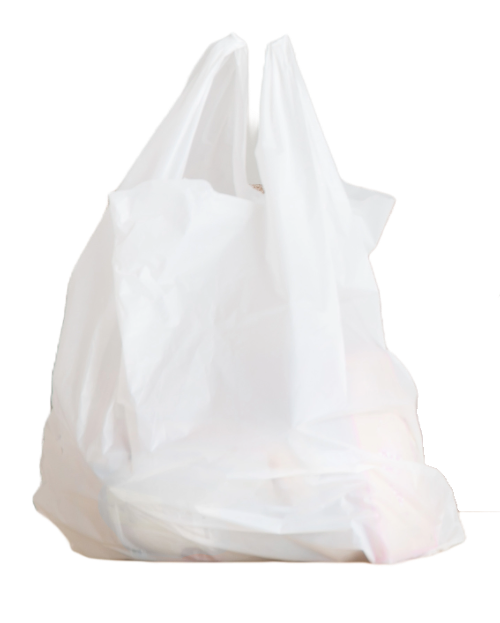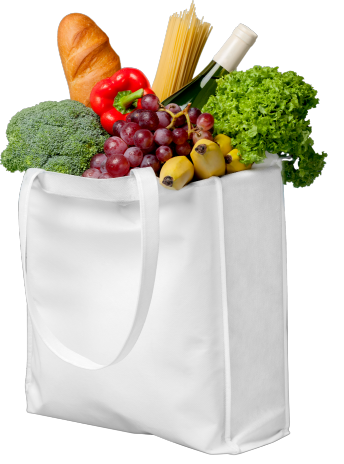Single-Use Carryout Bag Ban
New restrictions apply to the types of pre-checkout and carryout bags that may be distributed to customers at stores.
Pre-checkout Bags: Beginning January 1, 2025, stores will only be allowed to distribute pre-checkout bags to customers that are recycled paper bags or compostable bags that meet specific criteria.
Carryout Bags: Beginning January 1, 2026, stores will only be allowed to distribute recycled paper bags to customers at the point of sale.
California has a single-use carryout bag ban, SB 270.
Customers can not receive single-use plastic carryout bags from most:
- Grocery stores
- Retail stores with a pharmacy
- Convenience stores
- Food marts
- Liquor stores
Until January 1, 2026, these stores may sell reusable plastic bags made with recycled content or recycled paper bags.
The statewide single-use carryout bag ban requirements include:
- Stores must charge at least 10 cents per bag.
- The stores that sell bags keep the money and must use it to cover:
- Costs of providing the bags
- Compliance with the bag ban
- Educational materials or an educational campaign
- Stores cannot require customers to purchase a bag.
SB 1053 (Blakespear, 2024) was signed into law by Governor Gavin Newsom, replacing SB 270. All statutory and regulatory program requirements enacted by SB 270 will remain in full effect until January 1, 2026.
Through December 31, 2025, CalRecycle continues to:
- Accept certification fees and proofs of certification
- Operate the Reusable Grocery Bag Reporting System and
- Maintain the List of Certified Reusable Grocery Bags and Producers.
CalRecycle does not have enforcement authority over the single-use carryout bag ban. Cities, counties, and the Office of the Attorney General enforce the bag ban.
A person can report violations to the California Attorney General’s Office using its online reporting form, or to the local District Attorney, City Attorney, or City Prosecutor’s office where the violation occurred.
Local Ordinances Across California
Every store throughout California must comply with the requirements of the law, regardless of where the store is located. If the store is in a city or county that has its own bag ordinance, however, the store may need to comply with the local requirements as well.
A list of cities and counties that have adopted bag ordinances is available. This page may not contain every local jurisdiction in California with an ordinance that restricts or prohibits the use of certain bags. We recommend checking with your local city or county authority to verify whether your city or county has its own bag ban ordinance that is in effect.

Stores Banned from Providing Single-Use Plastic Bags
- Full-line, self-service retail stores with gross annual sales of at least $2 million that sell a line of dry groceries, canned goods, or nonfood items, and some perishable items.
- Large retail stores with a pharmacy that have at least 10,000 square feet of retail space and that generate sales or use tax.
- Convenience stores, food marts, or liquor stores that are engaged in the retail sale of a limited line of goods, generally including milk, bread, soda, and snack foods, and that hold a Type 20 or Type 21 license issued by the Department of Alcoholic Beverage Control.
More information on which stores must abide by the bag ban can be found in statute.
If you are uncertain whether a particular business meets the definition of “store,” as provided in statute, we recommend that you consult with an attorney.
Reusable Grocery Bag Certification Requirements
Stores may only sell or distribute reusable grocery bags made by producers certified by a third-party certification entity to sell reusable grocery bags in California.
Statutory requirements for reusable grocery bags vary based on the kind of material used to make the bags.
Generally, reusable bags must:
- Be certified to satisfy legal requirements. The certification must be provided by a single third-party certification entity that is either:
- An ISO/IEC 17025 laboratory or
- An ISO/IEC 17065 certification body
- Have a handle and be designed for at least 125 uses;
- Have a volume capacity of at least 15 liters (about 4 gallons);
- Be machine washable or capable of being cleaned and disinfected; and
- Have printed on the bag:
- The manufacturer’s name and country
- A statement that the bag is a reusable bag designed for at least 125 uses printed on the bag or on a tag
- Recycling instructions if the bag is recyclable
Bag producers must resubmit proofs of certifications for reusable grocery bags every two years.
Reusable Grocery Bags Made of Plastic Film
Other requirements for reusable grocery bags made from plastic film include :
- Made with a minimum of 40% postconsumer recycled material.
- Certified recyclable in the state by the third-party certification.
- At least 2.25 mils thick.
A complete set of requirements can be found in
Public Resources Code Sections 42280 – 42288.

Bag manufacturers and distributors that sell these types of reusable grocery bags in specified California stores must pay a certification fee and submit proof of certification to CalRecycle via the Reusable Grocery Bag Reporting System (RGBRS).
- Once CalRecycle receives proof of certification via the RGBRS, and the certification fee, CalRecycle will review the proof of certification for completeness.
- When the proof of certification is deemed complete by CalRecycle, the names of the bag producers and their certified bags will be posted to the list of Certified Reusable Grocery Bags and Producers.
- CalRecycle updates the list of Certified Reusable Bags and Producers when it receives proofs of certification and supporting documents.
- Stores subject to the law must ensure the bags they sell are properly certified.
- The certifications for reusable grocery bags must be renewed every other year.
- Bag producers must resubmit proofs of certifications every two years.
Certification Fee
Through the rulemaking process, CalRecycle created a certification fee schedule for reusable grocery bag producers. To learn more, visit CalRecycle’s SB 270 Rulemaking webpage.
SB 270 Questions and Answers
The information in these Q&As is provided as a courtesy only. Refer to the statute and regulations for the full requirements of the law.
Who can answer questions about the application of tax to bags?
The California Department of Tax and Fee Administration can answer tax-related questions about bags. Its toll-free number is 1-800-400-7115.
Is there a separate certification requirement for suppliers of postconsumer recycled material used in plastic reusable grocery bags?
No. The bag ban statute does not contain a separate requirement for postconsumer recycled material suppliers to certify their recycled plastic feedstock for use in manufacturing reusable grocery bags.
However, the proof of certification submitted to CalRecycle by producers of plastic film reusable grocery bags must include:
- Verification of the required percentage of post-consumer recycled material content:
- 20% before January 1, 2020 and
- 40% after
- The information specified in Section 42281.5 of the Public Resources Code.
What kind of bags does the single-use carryout bag ban prohibit?
Although the law often is described as a “plastic bag ban,” it does not prohibit the distribution of all plastic bags. Unless an exception applies, the ban applies to “single-use carryout bags.”
Single-use carryout bags are defined as any bag made of plastic, paper, or other material unless the bag is made out of recycled paper or certified as a reusable grocery bag.
In general, covered stores may not distribute any bag that is not a certified reusable grocery bag or recycled paper bag at a point of sale.
Are there any bags not prohibited by the single-use carryout bag ban?
Yes. Examples include:
- Bags used by pharmacies for prescriptions.
- Bags without handles used to protect a purchased item from damage or contamination.
- Bags used to contain unwrapped food items like bulk foods.
- Bags without handles that are designed to be placed over articles of clothing on a hanger, such as dry cleaning bags.
What if a store would like to sell compostable plastic bags?
Under Section 42283 of the statute, stores may sell compostable plastic bags if:
- They are located in a jurisdiction where:
- The majority of residential households have access to curbside collection for composting and
- The local government has voted to allow the sale of compostable bags to consumers.
- The bags must meet the specifications of the American Society of Testing and Materials International Standard Specification for Compostable Plastics D6400.
Additionally, any store may sell compostable plastic bags that meet the requirements set out in section 42281 of the statute for compostable, reusable plastic bags. Stores must charge at least 10 cents per compostable bag.
If I am using a WIC payment card or voucher or an EBT card to pay, do I have to pay for a bag?
No. Stores are required to provide a reusable grocery bag or a recycled paper bag free of charge to customers using one of these payment methods.
Can a person challenge a reusable grocery bag producer’s certification?
Yes. A person may object to the certification of a reusable grocery bag producer by filing an action for review of that certification in the superior court of a county that has jurisdiction over the reusable grocery bag producer.
Is there a certification requirement for recycled paper bags?
No, but recycled paper bags must meet requirements of the law:
- Contain at least:
- 40% postconsumer recycled material if rated above eight pounds
- 20% postconsumer recycled material if rated at eight pounds or smaller
- Be accepted for recycling in curbside programs in most households in California
- Have printed on the bag all of these:
- The name of the manufacturer
- The country where the bag was manufactured
- The minimum percentage of postconsumer content
What are the penalties for violating the single-use carryout bag ban?
A store or producer of reusable grocery bags that violates the law may be fined $1,000 per day for the first violation, $2,000 per day for the second violation, and $5,000 per day for the third and subsequent violations.
What if my city or county has its own bag ban?
Every store in California that is subject to the statewide single-use-carryout bag ban must comply with its requirements, regardless of where the store is located. If the store is located in a city or county that has its own bag ordinance, however, the store may need to comply with the local requirements as well.
Consult your local city or county authority to verify if your city or county has its own bag ban ordinance that is in effect.
To submit complaints, visit the OAG Consumer Complaint page.
For more information, contact SB270@calrecycle.ca.gov
